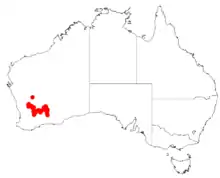Acacia consanguinea
Acacia consanguinea is a shrub of the genus Acacia and the subgenus Plurinerves that is endemism to south western Australia.
| Acacia consanguinea | |
|---|---|
| Scientific classification | |
| Kingdom: | Plantae |
| Clade: | Tracheophytes |
| Clade: | Angiosperms |
| Clade: | Eudicots |
| Clade: | Rosids |
| Order: | Fabales |
| Family: | Fabaceae |
| Clade: | Mimosoideae |
| Genus: | Acacia |
| Species: | A. consanguinea |
| Binomial name | |
| Acacia consanguinea | |
 | |
| Occurrence data from AVH | |
Description
The spreading broom-like shrub typically grows to a height of 0.4 to 1.5 metres (1 to 5 ft).[1] It has terete and nervless ash grey coloured branchlets with caducous stipules. Like most species of Acacia it has phyllodes rather than true leaves. The ascending to erect evegreen phyllodes are straight to shallowly incurved with a length of 2 to 7 cm (0.79 to 2.76 in) and a diameter of 1 to 1.5 mm (0.039 to 0.059 in) and have eight obscure nerves.[2] It blooms from August to September and produces yellow flowers.[1]
Taxonomy
It belongs to the Acacia fragilis group related to A. fragilis and A. uncinella.[2]
Distribution
It is native to an area in the Goldfields-Esperance and the Wheatbelt regions of Western Australia where it is commonly situated on low rises and plains growing in gravelly sandy soils.[1] The range of the shrub extends from around Muntadgin in the west to as far east as Coolgardie with at least one outlying population found around Wialki much further to the north where it is usually a part of scrub or heath communities.[2]
See also
References
- "Acacia consanguinea". FloraBase. Western Australian Government Department of Parks and Wildlife.
- "Acacia consanguinea R.S.Cowan & Maslin". Wattle - Acacias of Australia. Lucid Central. Retrieved 21 October 2020.